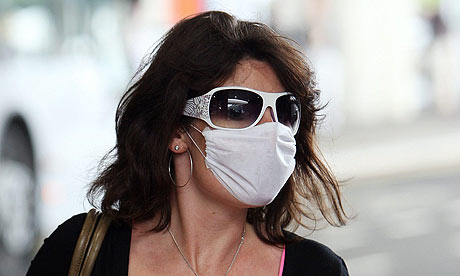
Universities have started to stockpile disposable rubber gloves and soap powder in case there are multiple outbreaks of swine flu on campuses this September, it emerged yesterday.
The news came as the government advised nurseries to remove soft toys and discourage children from sharing crayons and musical instruments to stop the spread of the virus.
University managers met yesterday to plan for the worst-case scenario of hundreds of students and staff off sick with the H1N1 virus at the start of the new term.
The vice-chancellors' umbrella group, Universities UK, held a seminar at its London headquarters at which campus managers swapped ideas on how they would cope if there were severe outbreaks of swine flu at their institutions.
Younger adults are, after pregnant women and young children, among the most vulnerable to H1N1.
Several universities will ask new students in September to make "flu buddies" – friends who agree to look after each other if they think they have swine flu.
Others, such as Edge Hill University in Ormskirk, Lancashire, and Northumbria University are stockpiling disposable rubber gloves for their cleaners as part of their infection control plans.
Edge Hill has advised its academic registrar to plan for the possible cancellation of graduation ceremonies under its pandemic flu response plan. The university is also gathering supplies of hospital antiseptic and soap powder.
The chief executive of Edge Hill, John Cater, said he expected the numbers of students and staff with suspected swine flu to be in the hundreds by the autumn.
One university spokesman said campus managers across the UK were worried overseas students would not turn up at the start of term out of fear that the country was a hotspot for swine flu. Britain has the third highest number of recorded cases of H1N1 in the world.
But Professor Michael Farthing, incoming chair of Universities UK's health and social care policy committee and the vice-chancellor of Sussex University, said international students could be assured that the UK was "as well prepared as any other country to deal with this situation".
Kate Dodd, an executive officer of the Association of Managers of Student Services in Higher Education, said she had heard that dozens of overseas students who were due to take resits this summer had phoned their universities to check what they were doing to protect students.
She said: "That's an early sign that there's some nervousness, but it might also be a reluctance to spend money on an air flight. We need to watch this."
Many universities, including the University of Hertfordshire and Edge Hill, are making sure that courses are available online so that students who are sick or whose lecturers are ill can study at home.
Prof Farthing said: "Universities are places where many people come and go and also gather in large numbers. We are experienced in handling health issues that occur. Universities are using websites, social media, helplines and other channels to ensure that students, staff, parents and health professionals know the latest situation and have access to appropriate advice."
Meanwhile, guidance for childminders, schools and nurseries on planning for a human flu pandemic, published by the Department for Children, Schools and Families (DCSF) has advised against children sharing toys, crayons and musical instruments.
The guide for childminders tells them: "Try to avoid children sharing soft toys as these are hard to clean adequately; you may find it easier to avoid using soft toys altogether. Clean hard toys after use as the virus can survive on hard surfaces."
The guidance for schools and nurseries says: "Discourage the sharing of pencils, crayons and pens during a pandemic. Encourage the wiping and cleaning of hands and objects when passing round objects like musical instruments or toys. Do not allow children to share musical instruments."
A spokesman from the DCSF said: "We are not suggesting taking all toys out of play settings, just to take care with the use of shared toys, which can be a way of spreading infection. This is about striking a sensible balance between continuing life as normal but also taking simple, common sense steps to protect children."
It has also emerged that ministers have talked to the BBC about the corporation clearing its schedules for educational programmes if schools were closed because of swine flu.

